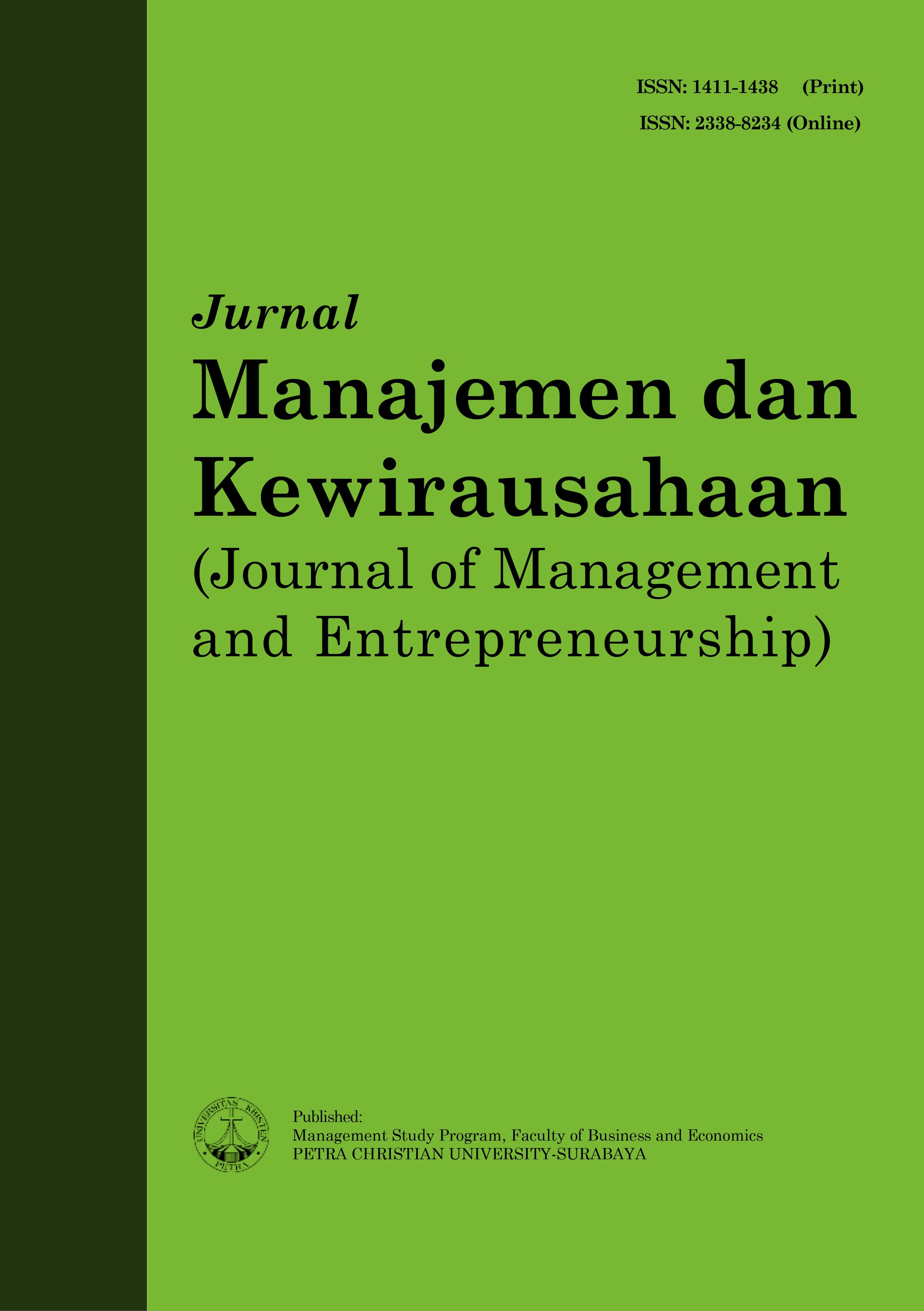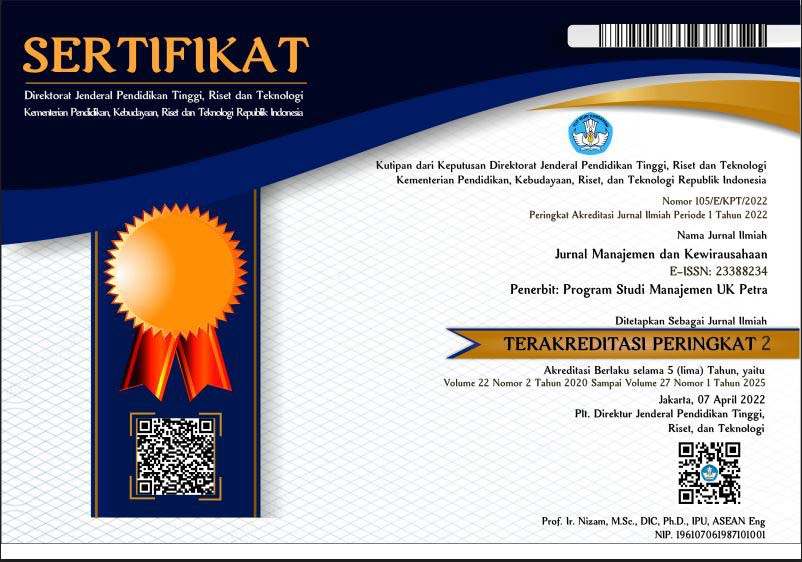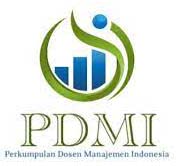THE ROLE OF MOTIVATION AS MEDIATION IN IMPROVING EMPLOYEE PERFORMANCE IN THE GOVERNMENT OF SURABAYA CITY, EAST JAVA
 :
:
https://doi.org/10.9744/jmk.23.1.52-60
Keywords:
Servant leadership, professionalism, work culture, motivation, employee performanceAbstract
This paper discusses the causal relationship between servant leadership, professionality, work culture, motivation, and the performance of Surabaya City government employees. One model is proposed to examine the role of motivation as a mediating variable in the indirect relationship of servant leadership, professionality, work culture and performance. The population is the government employees of Surabaya City. Analysis by SEM, on 290 respondents, using the convenience sampling method. The results show that the model is accepted, and also show that servant leadership, professional, and work culture has an effect on motivation. Servant leadership, work culture and motivation have an effect on employee performance. Motivation is a positive mediating variable in the relationship between servant leadership, professional, and work culture with performance.References
Arianto, D.A.N. (2013). The Influence of Discipline, Work Environment and Work Culture on Teaching Performance. Jurnal Economia, 9(2), 191-199.
Baker, Kathry A. (2002). Organizational Culture. Journal of Organizational Culture, No. 20, 1-11.
Bernardin, H. Jhon, & Russel, E.A. (2003). Human Resource Management: An Ex-periential Approach, Singapore: Mc. Graw-Hill.
Cahyono, Budhi, & Suharto (2005). The Influence of Organizational Culture, Leadership and Work Motivation on Human Resources Performance at the DPRD Secretariat of Central Java Province. Jurnal, JRBI Vol. 1, 24-32.
Chen, C., Chen, C.V. & Li, C. (2013). The Influence of Leader’s Spiritual Values of Servant Leadership on Employee Moti-vational Autonomy and Eudaemonic Well-Being. J Relig Health 52, 418-438.
Chinomona, R., Mashiloane, M., & Pooe, D. (2013). The Influence of Servant Leadership on EmployeeTrust in a Leaderand Commitment to the Organization. Mediter-ranean Journal of Social Sciences, 4(4), 405-414.
Dahlan, H., Modding, B., Bim, MJ, & Bijan, J. (2017). The Effect of Leadership, Organisational Culture and Work Moti-vation on Job Satisfaction and Job Perfor-mance among Civil Servants in Maros District Technical Working Unit. Interna-tional Journal of Management & Social Sciences, 7(1), 52-64.
Dalimunthe, RF. (2002). The Influence of Individual Characteristics, Entrepreneur-ship, Leadership Style on Business Ability and the Success of Small Weaving and Embroidery Industries in North Sumatra, West Sumatra and Riau. Universitas Airlangga. http://lib.unair.ac.id/
Ndraha, Taliziduhu (2012). Introduction to Human Resource Development theory. Jakarta : Rineka Cipta
Eliyana, A., Ma’arif, S., & Muzakki (2019). Job satisfaction and organizational commitment effect in thetransformational leadership towards employee performance. European Research on Managemen tand Business Economics 25, 144-150.
Futri, P.S., & Juliarsa, G. (2014). The Influence of Independence, Professionalism, Education Level, Professional Ethics, Experience, and Job Satisfaction of Auditors on Audit Quality of Public Accounting Firms in Bali. Jurnal Akuntansi Universitas Udayana, 7(2), 444-4460.
Gibson (2013). Performance assessment. Jakarta : Erlangga Publisher.
Giantari, I.A.I., Riana, IG. (2017). The Influence of Organizational Culture on Work Moti-vation and Performance of Klumpu Bali Resortsanur Employees. Jurnal Manajemen Unud, 6(2), 471-498.
Hakim, A. (2006). Analysis of the Influence of Motivation, Organizational Commitment and Organizational Climate on Employee Performance at the Transportation and Telecommunications Office of Central Java Province. JRBI, 2(2), 165-180.
Hair, J.F., Anderson, R.E., Tatham, R.L., & Black, W.C. (2014). Multivariate Data Analysis , 6th Edition, Upper Saddle River, New Jersey: Prentice-Hall, Inc,.
Permanasari, R., Setyaningrum, R.M, & Sundari, S. (2014). Relationship Model Between Competence, Professionalism And Perfor-mance Teaching. Jurnal Bisnis, Manajemen & Perbankan, 1(2), 157-174
Harwiki, W. (2013). Influence of Servant Leadership to Motivation, Organization Culture, Organizational Citizenship Behavior, and Employee’s Perfor-mance in Outstanding Cooperatives East Java Province, Indonesia. IOSR Journal of Business and Management 8(5),50-58
Kaminska, M. (2016). Servant leadership and experience of job satisfaction and job autonomy among residents of small Icelandic town, https://pdfs.semanticscholar. org/ accessed 30/07/ 2020.
Khan, A., Khan, A.U, & Zeeshan, M. (2016). Consequences of Servant leadership style on employees Motivation (Empirical study on private and public sector Universities Employees). Journal of Applied Environ-mental and Biological Sciences, 6(5),124-138
Koesmono, H.T (2014). The Influence of organizational Culture, Servant Leadership, and Job Satisfaction Toward Organizational Commitment and Job Performance Through Work Motivation as Moderating Variables for Lecturers in Economics and Management of Private Universities in East Surabaya. Educational Research International, 3(4), 25-39
Kotter, & Heskett (2012). Corporate Culture and Performance. New York: The Free Press.
Lestari, S., Florentinus, T.S., & Sudana, IM. (2019). The Effect of Incentive, Principal Leadership, and Motivation toward Teacher Professionalism in Conducting Learning Activity at Vocational High Schools. Educational Management, 8(1), 34-43.
Matheus, E. (2018). The Influence of Professi-onalism, Job Satisfaction, Motivation, and Work Environment on the Performance of the Tax Auditor. JOM FEB, 1(1), 1-14.
Mc. Clelland, D.C. (1987). Human Motivation. New York : Cambridge University Press.
Muhtasom, A., Mus, H.A.R, Bijang, J., & Latief, B. (2017). Influence of Servant Leadership, Organizational Citizenship Bahaviour on Organizational Culture and Employee Performance at Star Hotel in Makassar. International Journal of Education and Research, 5(10), 71-88
Patterson, C.H. & Purkey, W.W. (1993). The Preparation Of Humanistic Teachers For Next Century Schools. Department of Counseling and Specialized Educational Development. The Journal of Humanistic Education and Development, 30,147-155
Popescu, D.M., Bulei, L., Mihalcioiu, V. (2014). The Impact Of Professional Identity Factors On Employee Motivation. Proceedings Of The 8th. International Management Conference "Management Challenges For Sustainable Development", November 6th-7th, 2014, Bucharest, Romania
Purwandari, A. (2008). The concept of midwifery history and professionalism. Jakarta: EGC.
Rahayuningsih, S. (2012). Analysis of the Influence of Professionalism on Organiza-tional Commitment, Job Satisfaction, Job Performance and Desire to Change for Professional Nurses (Study at Sultan Agung Islamic Hospital Semarang). Conference In Business, Accounting, And Management (CBAM), 1(3), 41-46
Robbins, P Stephen. (2008). Organizational Behavior (9th Edition), New York: Prentice Hall International.
Saleem,S., Zhang, Y.Z., Gopinath, C., & Adeel, A. (2020). Impact of Servant Leadership on Performance: The Mediating Role of Affective and Cognitive Trust. SAGE Open January-March 2020: 1 –16
Sedarmayanti (2013). Public Administration Reform, Bureaucratic Reform, and Future Leadership. Bandung: PT. Refika Aditama.
See-Kwong Goh, Brian Zhen-Jie, Low. (2014). The Influence of Servant Leadership towards Organizational Commitment: The Mediating Role of Trust in Leaders. International Journal of Business and Management, 9(1), 17-25.
Shishigu, A. (2015). Factors Affecting Teachers Motivation and Professionalism: The Case of Public Primary Schools in Addis Ababa, Ethiopia. The International Journal Of Humanities & Social Studies, 3(8), 140-146
Siagian, Sondang P. (2013). Human Resource Management, Jakarta : Bumi Aksara.
Sihombing, S., Astuti, E., Al Musadieq, M., Hamied, D., & Rahardjo, K. (2018). The effect of servant leadership on rewards, organizational culture and its implication for employee’s performance. International Journal of Law and Management, 60(2), 505-516.
Sinha, S., Singh, AK., Gupta, N., & Dutt, R. 2019. Impact of Work Culture On Motivation And Performance Level Of Employees In Private Sector Companies. Acta Oeconomica Pragensia, University of Economics, Prague, (6), 49-67.
Downloads
Published
How to Cite
Issue
Section
License
Authors who publish on this journal agree to the following terms:
- Authors retain copyright and grant the journal right of first publication with the work simultaneously licensed under a Creative Commons Attribution License that allows others to share the work with an acknowledgement of the work's authorship and initial publication in this journal.
- Authors are able to enter into separate, additional contractual arrangements for the non-exclusive distribution of the journal's published version of the work (e.g., post it to an institutional repository or publish it in a book), with an acknowledgement of its initial publication in this journal.
- Authors are permitted and encouraged to post their work online (e.g., in institutional repositories or on their website) prior to and during the submission process, as it can lead to productive exchanges, as well as earlier and greater citation of published work (See The Effect of Open Access).


















